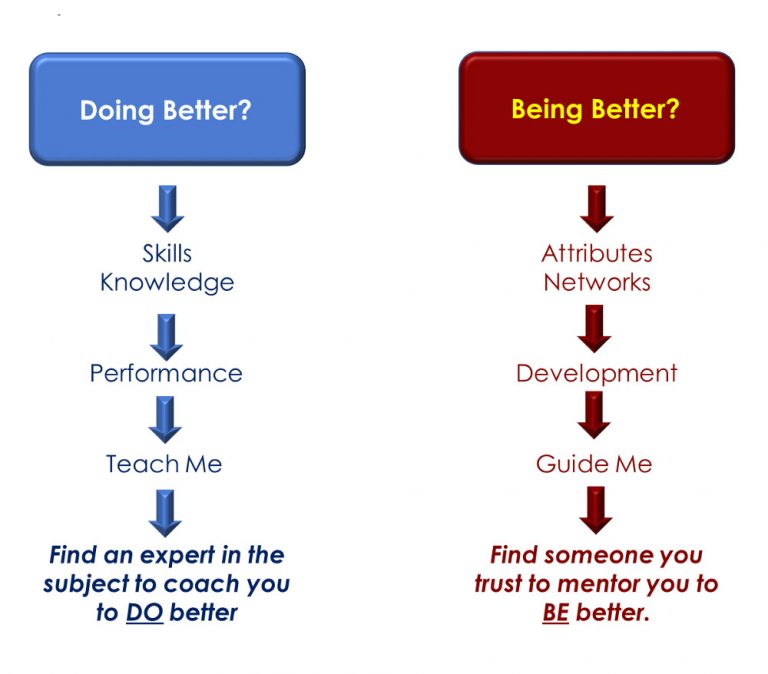Role of a Mentor
- Interested in the development of others
- Values diversity
- A strategic thinker
- An active and careful listener
- Acts as a sounding board
- Open, enthusiastic, relaxed, and supportive of their mentee in reaching their goals
- Willing to share their experience, expertise and networks
- Humble, patient and mentally tough
- Willing to probe and challenge
- Willing to be challenged and learn
- Disciplined, especially with regard to confidentiality
- Determine whether you are looking to do better or whether you are looking at being better?
- Doing better is about skills and k
- Being better is about attributes and n
- Skills and knowledge are about your performance, while attributes and networks are about your development, as a person.
- Maximising your performance is more about being ‘taught’, while your development is more about being ‘guided’.
- If you are looking to increase your performance, you are best advised to seek a coach whereas if you are looking for someone who can assist you develop, as a person, you are best to seek a mentor.

Another model that adds to the SKAN model and can help in identifying the scope of mentoring is the independent thinking model.

| Type of Space | Advisory Space | Coaching Space | Mentoring Space | Independent Thinking Space** |
|---|---|---|---|---|
| Focus of Questioning | Asking to solve | Asking to improve performance | Asking to guide development | Asking to stimulate thinking |
| Source of Value | Expertise | Asking to improve performance | Life experience | Uninterrupted (ing) attention |
| Role | Expert | Facilitator | Facilitator | Thinking Partner |
| Structure of Conversation | Ask-Diagnose-Tell | Ask-Explore-Co-create | Ask-Explore-Co-create | Ask-Listen-Ask |
This model provides a different, but consistent, perspective on mentoring. It looks at mentoring as part of a continuum, that moves from dependent thinking to independent thinking. In this model mentoring is positioned closer to the independent thinking end of the continuum. But, in truth, mentoring can move up and down this continuum, depending on the needs of the mentee. Sometimes mentoring will look more like coaching while at other times mentoring will look more like a thinking partner. Or it could be something in between – a confidant or a critical friend.
* Neville Taylor APM MAICD, Commander (rtd) Victoria Police – Capability Advisor (2016-2019). Visiting Fellow – Australian Institute of Police Management (2015 , 2021-2022). Facilitator in leadership, ethics, adaptive challenges, coaching & mentoring. Book reviewer published Oxford University Press, Oxford UK ISBN: 978-0-19-872862-7, Policing Advance Access published January 4, 2016. “Police
Leadership – Rising to the Top, Fleming, J. (ed.) (2015)
** The concept of an independent thinking environment is based on the work of Nancy Kline and more particularly, her book: “The Promise that Changes Everything: I won’t interrupt you”. It is beyond the scope of this guide to explore the concepts of creating an independent thinking environment, as outlined in the book, but this book is a highly recommended read for those of you who are serious about taking their mentoring and their relationships to the next level.
